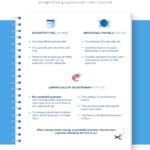What expenses should appear in every family budget?
It is common to think that saving is synonymous with not spending. But nothing could be further from the truth. Saving means spending better to make the most out of your money and, in addition, putting an amount aside to meet financial goals. The first step to achieve this is to draw up a family budget where all expenses are properly classified.

Organizing your finances is essential to building your financial health. A budget that properly reflects expenses, in addition to income, is a very useful tool that will help you to track your financial status and make informed decisions. According to the classification proposed by the specialized personal finance website Finanzas Para Todos – published by the Bank of Spain and the Spanish National Securities Commission within the framework of the Financial Education Plan - these are the expenses that a family budget should envisage to be really useful.

Mandatory fixed expenses
Your unavoidable recurring expenses. We know beforehand when they’re due and how much we’re going to have to pay. This category includes housing, education, insurance, taxes and loan related costs, to name a few. These payments usually have to be met on time to avoid penalties, which would mean an increase in debt.
Unavoidable fixed costs are a priority and must be paid first. Therefore, if you have a hard time meeting these payments, you should consider cutting expenses in other categories or, if that’s not enough, talk to your creditors to renegotiate debt.
Unavoidable variable expenses
This category, just as the previous one, consist of expenses that are necessary to lead your everyday life. However, in this case, the amounts are not fixed, and therefore can vary depending on circumstances. This happens, for example, with your grocery expenses. It is an unavoidable expense, but you could lower it, if necessary, by making some changes to your spending habits, such as switching to store brand products instead of name brands or tracking product prices in different supermarkets and shop accordingly. This category also includes transportation, clothing, electricity, water, etc. These are all costs you can try to lower if you have a hard time meeting your fixed unavoidable expenses...
Superfluous or discretionary expenses
These are expenses you can go without, although many times you may not be aware you can. The coffee during your coffee break, things you buy impulsively when you pass by a store, subscriptions to services that you rarely use… these are usual expenses that fall into this category. Combined they can have a negative impact on your family’s finances, so it is always a good idea to reduce them and, if necessary, eliminate them.
However, this category is perhaps the one most of us have trouble keeping under check. Discretionary expenses vary greatly and are linked to your appetites and needs, so they have an emotional dimension that sometimes does not allow to think clearly about their financial consequences. A budget will help you think twice about these expenses to see them for what they usually are: a waste of income that rarely help you improve your quality of life significantly. That does not mean that, given the right financial position, you should never pamper yourself or spend on something that’s going to make you feel good, but if you have trouble meeting your unavoidable expenses, these discretionary expenses should be the first ones you cut.
Saving
A proper financial budget should always include a savings heading. But, how much of your income should you place under this category? It is always hard to "set aside" an amount every month, regardless of how advisable it is to plan for your future needs. The 50-20-30 rule is a good guide. It entails dividing our monthly income into the following percentages: 50% for unavoidable and necessary expenses, 30% for discretionary expenses and 20% for savings.
A good trick to avoid the temptation of spending this 20 percent, is to transfer the corresponding amount immediately to a savings account as soon as your paycheck comes in, for example. That way, you’ll only be able to spend the amounts budgeted for expenses, and, also, your savings will increase thanks to interest.
In short, a budget is a tool that will help you learn not only how to keep track of your financial standing, but also to spend better, be ready for unexpected financial emergency that comes your way and meet your savings goals, without giving up your living standards.